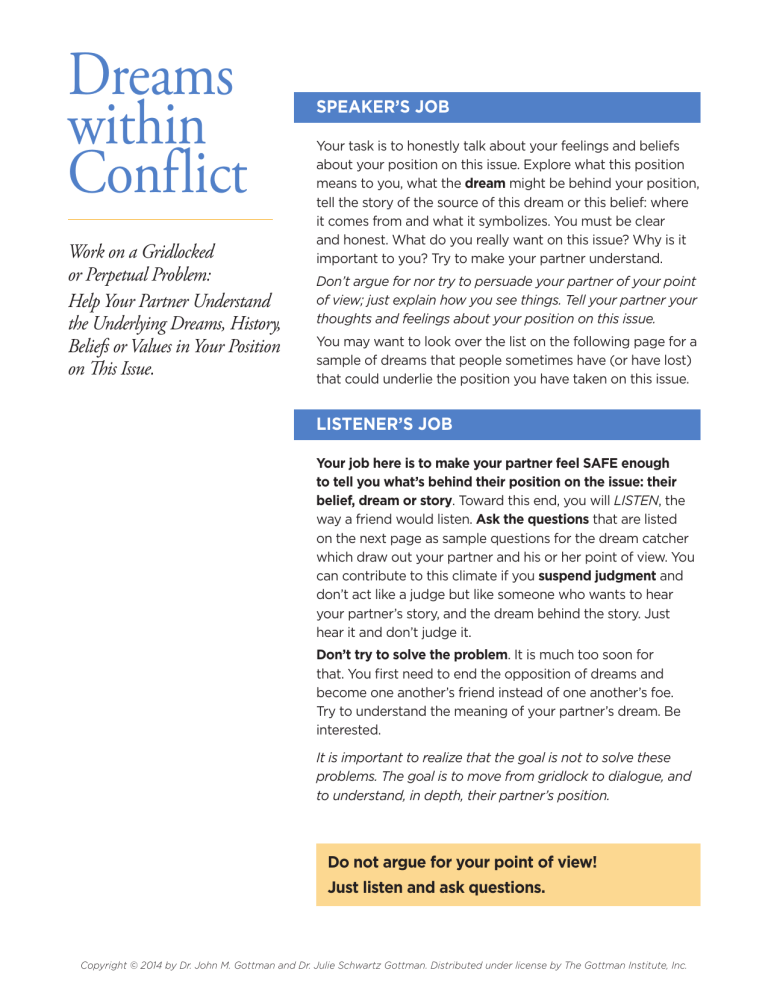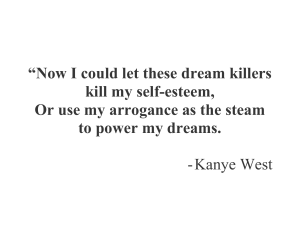
Dreams within Conflict Work on a Gridlocked or Perpetual Problem: Help Your Partner Understand the Underlying Dreams, History, Beliefs or Values in Your Position on This Issue. SPEAKER’S JOB Your task is to honestly talk about your feelings and beliefs about your position on this issue. Explore what this position means to you, what the dream might be behind your position, tell the story of the source of this dream or this belief: where it comes from and what it symbolizes. You must be clear and honest. What do you really want on this issue? Why is it important to you? Try to make your partner understand. Don’t argue for nor try to persuade your partner of your point of view; just explain how you see things. Tell your partner your thoughts and feelings about your position on this issue. You may want to look over the list on the following page for a sample of dreams that people sometimes have (or have lost) that could underlie the position you have taken on this issue. LISTENER’S JOB Your job here is to make your partner feel SAFE enough to tell you what’s behind their position on the issue: their belief, dream or story. Toward this end, you will LISTEN, the way a friend would listen. Ask the questions that are listed on the next page as sample questions for the dream catcher which draw out your partner and his or her point of view. You can contribute to this climate if you suspend judgment and don’t act like a judge but like someone who wants to hear your partner’s story, and the dream behind the story. Just hear it and don’t judge it. Don’t try to solve the problem. It is much too soon for that. You first need to end the opposition of dreams and become one another’s friend instead of one another’s foe. Try to understand the meaning of your partner’s dream. Be interested. It is important to realize that the goal is not to solve these problems. The goal is to move from gridlock to dialogue, and to understand, in depth, their partner’s position. Do not argue for your point of view! Just listen and ask questions. Copyright © 2014 by Dr. John M. Gottman and Dr. Julie Schwartz Gottman. Distributed under license by The Gottman Institute, Inc. SAMPLE QUESTIONS for the Dream Catcher (the Listener): SAMPLE DREAMS for the Dream Speaker 1. Do you have any core beliefs, ethics or values that are part of your position on this issue? 1. A sense of freedom 2. Is there a story behind this for you, or does this relate to your background or childhood history in some way? 3. Unity with nature 3. Tell me why this is so important to you. 4. What feelings do you have about this issue? 5. What would be your ideal dream here? 6. Is there a deeper purpose or goal in this for you? 7. What do you wish for? 2. The experience of peace 4. Exploring who I am 5. Adventure 6. A spiritual journey 7. Justice 8. Honor 9. Unity with my past 10. Healing 8. What do you need? 11. Knowing my family 9. Is there a fear or disaster scenario in not having this dream honored? 13. Having a sense of power 12. Becoming all I can be 14. Dealing with my aging 15. Exploring a creative side of myself 16. Becoming more powerful 17. Getting over past hurts 18. Becoming more competent 19. Asking God for forgiveness 20. Exploring an old part of myself I have lost 21. Getting over a personal hang up 22. Having a sense of order 23. Being able to be productive 24. A place and a time to just “be” 25. Being able to truly relax 26. Reflecting on my life 27. Getting my priorities in order 28. Finishing something important 29. Exploring the physical side of myself The bottom line about dreams is this: You don’t want to have the kind of relationship in which you win and are influential in the relationship but wind up crushing your partner’s dream. You want the kind of relationship in which each of you support one another’s dreams. If your dreams connect, so much the better. 30. Being able to compete and win 31. Travel 32. Quietness 33. Atonement 34. Building something important 35. Ending a chapter of my life 36. Saying goodbye to something 37. Love Copyright © 2014 by Dr. John M. Gottman and Dr. Julie Schwartz Gottman. Distributed under license by The Gottman Institute, Inc.

